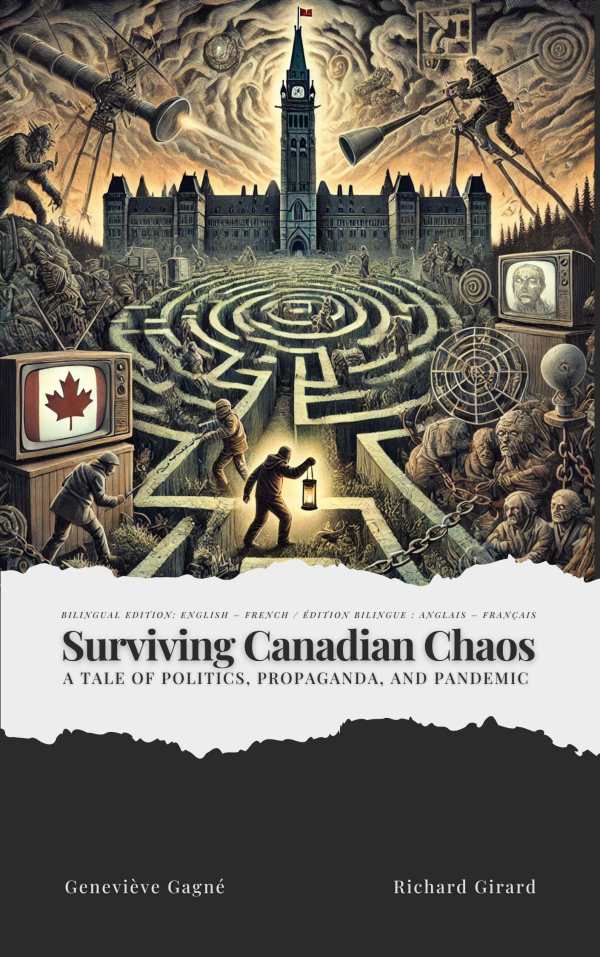
Surviving Canadian Chaos
A Tale of Politics, Propaganda, and Pandemic
Unflinching condemnations of past wrongdoings combine with critiques of contemporary missteps by those in power in the assertive political science critique Surviving Canadian Chaos.
Geneviève Gagné and Richard Girard’s bilingual political science book Surviving Canadian Chaos warns about the dangers of totalitarianism.
Arguing that Canada is descending ever deeper into authoritarianism, the book calls measures like lockdowns draconian and suggests that they increase governmental control at the expense of citizens’ well-being. It asserts that democratic participation is sacrificed by arrogant elites who manufacture consent. It also aims to uncover the root of this rot through a broad overview of relevant literature, urging citizens to seek truth even when it’s costly and to reclaim human connections. The mere act of writing the book is presented as an act of defiance.
A history of Canada is used to frame the book’s analyses of current events. It is unflinching in its condemnation of past wrongs like the mistreatment of Indigenous people. Still, the bulk of the analysis is devoted to contemporary criticisms, as of the response to COVID-19, which is presented as a tyrannical, unscientific overreach of authority. Also examined are the roles of media in fostering government control and the corruption of the Canadian party system. An exploration of public relations expert Edward L. Bernays’s theory adds an intriguing psychological element to the book’s political focus.
A blend of synthesis and analysis, the book summarizes the work of various thinkers, including contemporary scholars, George Orwell, and Hannah Arendt, and relates their thoughts to both current events and the work of others. Interesting paradoxes are raised and explored—for example, the Canadian party system demands ambitious politicians, yet voters distrust politicians who seem ambitious, the book says. Popular-culture references, as to The Truman Show and The Crucible, are also used to comment on the dangers of modern totalitarianism.
The breadth of the book’s explorations, however, comes at the expense of depth and clarity. Too often, arguments are given glancing treatments, and undersupported assertions abound. For example, philosophies like “radical feminism” are denounced as “parasites,” but what these ideologies entail and specific examples of their harm are not provided. A shadowy elite is said to pull the strings at almost every turn, but few names are given, and little work is done to establish the ethos of the book’s lesser-known sources.
The inspiring story of Greek philosopher Diogenes resisting Alexander the Great bookends the text. Diogenes’s defiant philosophy is woven throughout the book, presented as an alternative to modern complacency. The potency of this imagery, however, is diluted by an overreliance on metaphors. A boa constrictor and its prey, a moth, a gargoyle, and wind in a forest are among the plentiful images used to describe society and the threats it faces. Even dinner-table conversations are presented as tainted by looming dangers. The heightened use of dramatic and figurative language obscures which of the described problems are most pressing. And while the conclusion provides a sliver of hope that somewhat mitigates the otherwise pervasive sense of dolor, gallant exhortations like “accepting our primal selves” are not translated into clear action steps.
Synthesizing work from a wide array of thinkers, the political science text Surviving Canadian Chaos examines the sinister forces lurking behind contemporary Canadian politics.
Reviewed by
Vivian Turnbull
Disclosure: This article is not an endorsement, but a review. The publisher of this book provided free copies of the book and paid a small fee to have their book reviewed by a professional reviewer. Foreword Reviews and Clarion Reviews make no guarantee that the publisher will receive a positive review. Foreword Magazine, Inc. is disclosing this in accordance with the Federal Trade Commission’s 16 CFR, Part 255.
